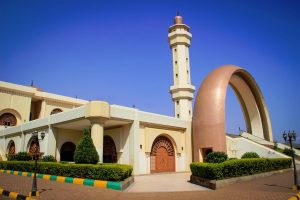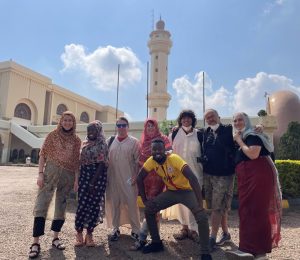Standing tall amidst the bustling streets of Kampala, the Gaddafi Mosque, officially known as the Uganda National Mosque, is a remarkable architectural gem that holds immense cultural and historical significance.
Named after the late Libyan leader Colonel Muammar Gaddafi, this grand mosque showcases the vibrant and diverse Islamic heritage of Uganda, fostering unity and faith within the community.
Its construction began in the 1970s; however, political instability and economic challenges delayed the project, and it was later completed in 2006. The Libyan leader contributed both financially and ideologically to the construction of the mosque, thus giving it its name.
The mosque boasts a unique blend of modern and traditional architectural styles. The mosque’s design by Syrian architect Samir Kassir combines elements of Islamic and Ugandan culture.

The main dome, towering at over 50 metres, is reminiscent of Ottoman-era mosques, while the minarets exhibit Swahili architectural elements.
The mosque’s facade is adorned with intricate calligraphy and distinctive geometric patterns, creating an awe-inspiring sight.
The mosque’s prayer hall, capable of accommodating over 15,000 worshippers, is a vast space adorned with beautiful Islamic motifs. Its carpet, imported from Saudi Arabia, covers an area of about 7,000 square metres.
Four minarets grace the mosque’s perimeter, reaching a height of approximately 60 meters. Visitors can climb to the top for breathtaking panoramic views of Kampala.
Islamic Cultural Centre: adjacent to the mosque stands the Islamic Cultural Centre, which houses a library, conference facilities, and an Islamic school. The centre serves as a hub for Islamic education and the promotion of cultural understanding.

The mosque plays a crucial role in fostering unity and religious harmony within Uganda’s diverse population. Open to both Muslims and non-Muslims alike, the mosque welcomes visitors to learn about Islamic culture and traditions.
It promotes interfaith dialogue through various programmes and events, aiming to build bridges between different religious communities.
Additionally, the mosque acts as a symbolic landmark, representing the peaceful coexistence of different faiths in Uganda.
The mosque has become a popular tourist destination in Kampala. Visitors from around the world are drawn to its stunning architecture, cultural significance, and panoramic views of the city.
Guided tours provide insights into Uganda’s Islamic heritage, offering visitors a chance to learn more about the vibrant Muslim community within the country.
